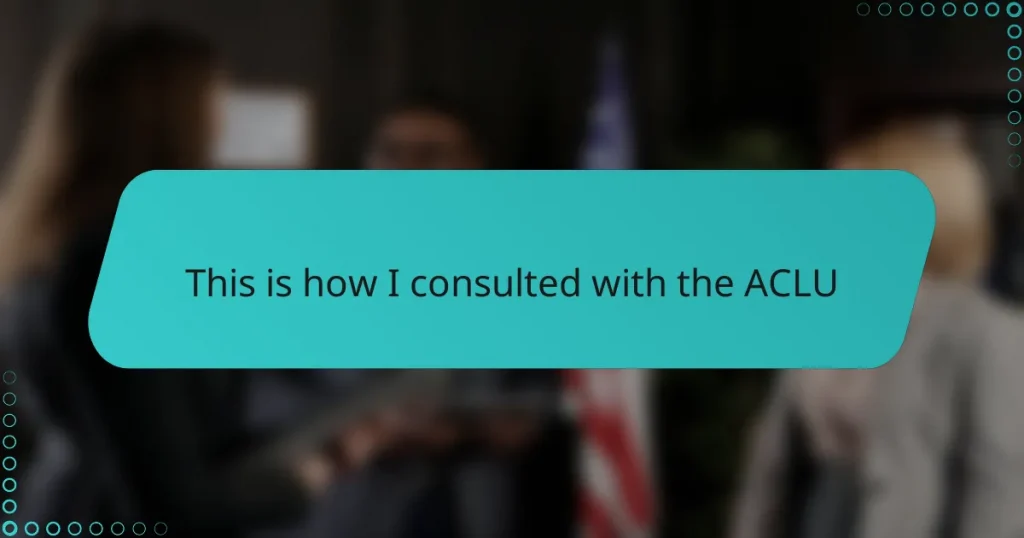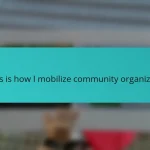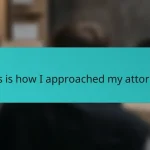Key takeaways
- Legal advocacy is driven by principles of fairness, equality, and respect, which are essential for effective representation and meaningful change.
- The ACLU actively defends civil liberties through a combination of legal expertise, grassroots activism, and public education, making their advocacy impactful beyond courtroom victories.
- Preparation for legal consultations, including gathering relevant documents and being transparent, is crucial for a productive engagement with legal advocates.
- Clear communication and realistic expectations enhance collaboration with legal support, empowering individuals throughout the legal process.
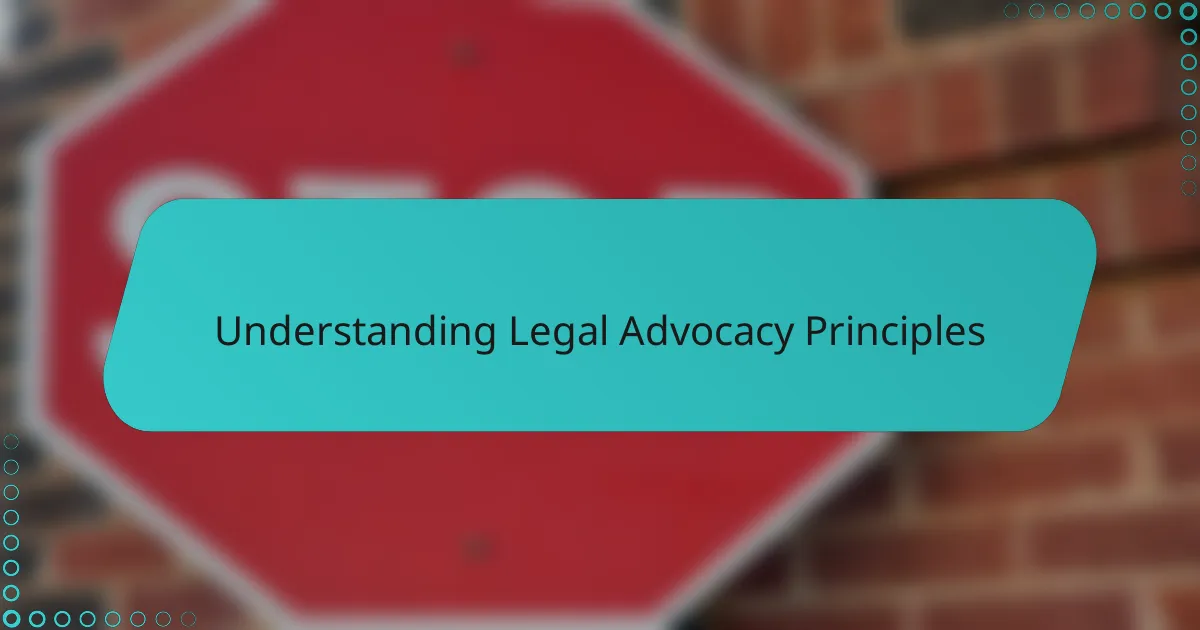
Understanding Legal Advocacy Principles
Legal advocacy, in my experience, is more than just arguing a case; it’s about standing up for rights with a deep sense of responsibility. Have you ever wondered what it takes to truly champion someone’s cause? It’s about understanding the law’s power to protect individuals and recognizing the nuances that make each case unique.
When I first delved into legal advocacy, I realized it requires a balance of passion and precision. You can feel the weight of every decision knowing that your advocacy can change lives. It’s a relentless pursuit of justice that demands both empathy and strategy.
What strikes me most is how principles like fairness, equality, and respect aren’t just theoretical—they’re the compass guiding every step. Without these core values, legal advocacy loses its meaning, becoming just another technical exercise. That’s why grasping these principles is essential before taking any action.
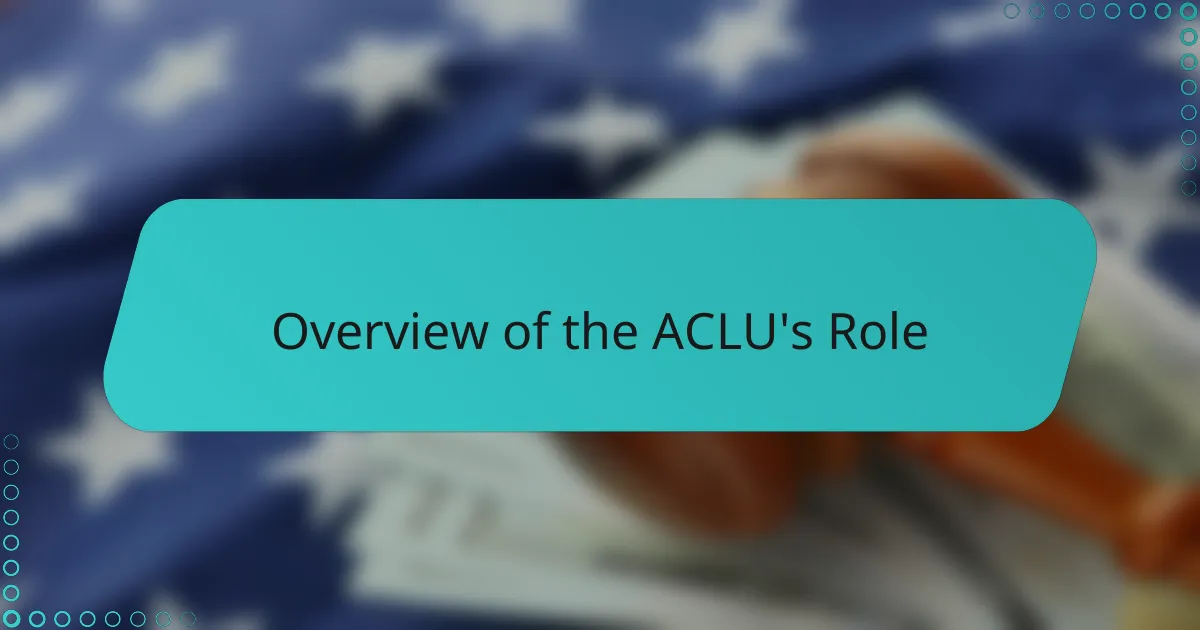
Overview of the ACLU’s Role
The ACLU’s role, as I’ve come to understand it, is much more than legal battles in courtrooms; it’s about defending the fundamental freedoms that form the backbone of our democracy. Have you ever paused to think how organizations like the ACLU shape the everyday rights we often take for granted? They don’t just react to legal issues—they proactively challenge laws and policies that threaten civil liberties.
From my perspective, what makes the ACLU stand out is their unwavering commitment to fight for everyone, even when the cause is unpopular. I remember feeling inspired by how fearless they are in taking on cases that others might avoid because of controversy or complexity. It’s a reminder that true advocacy requires courage and conviction, especially when confronting powerful interests.
What fascinates me most is their holistic approach—combining legal expertise with grassroots activism and public education. This multi-layered strategy shows me that effective legal advocacy isn’t confined to the courtroom; it’s about creating meaningful change in society. Doesn’t it make you appreciate the depth of their work beyond just winning cases?
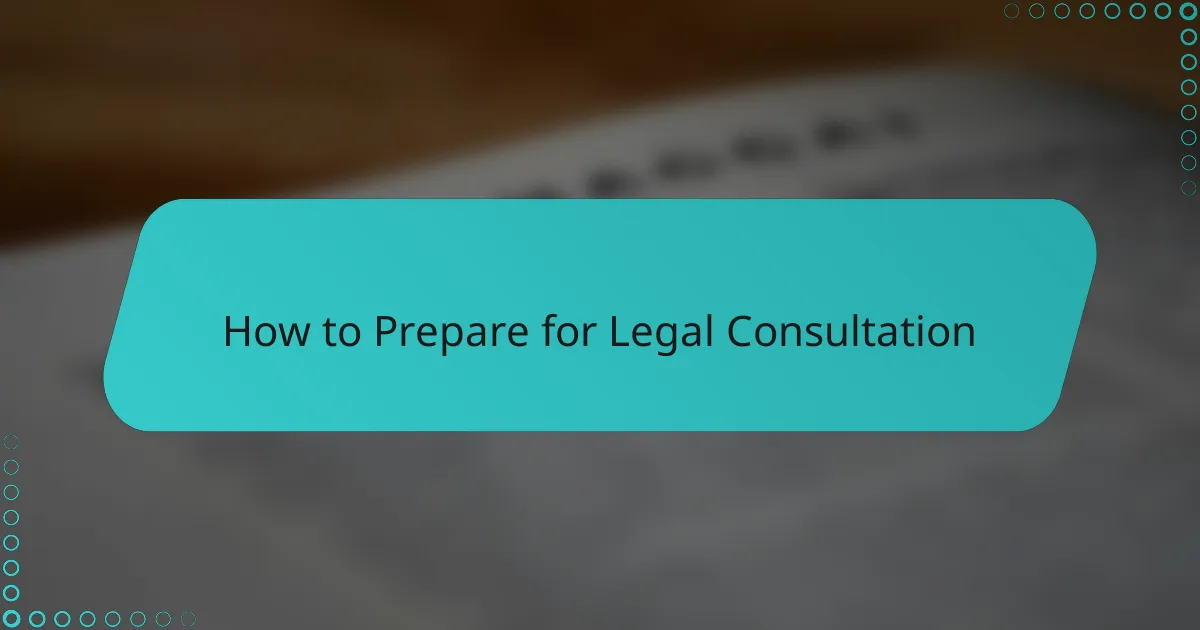
How to Prepare for Legal Consultation
Before any legal consultation, I always make it a point to gather every document that could be relevant—whether it’s emails, contracts, or official notices. Have you ever been caught off guard in a meeting because you forgot a key piece of information? Trust me, being organized not only saves time but also shows respect for the lawyer’s expertise.
Another thing I’ve found crucial is jotting down a clear timeline of events and key questions I want to ask. It’s easy to get overwhelmed during a consultation, so having a roadmap helps keep the conversation focused. When I first consulted with the ACLU, this preparation made all the difference in feeling confident and heard.
I also remind myself to be honest about all the details, even the ones that seem trivial or embarrassing. It’s tempting to leave out information that feels uncomfortable, but from what I’ve experienced, transparency builds trust and allows your lawyer to craft the best strategy possible. Isn’t that what you want—to know they have the full picture before advice is given?
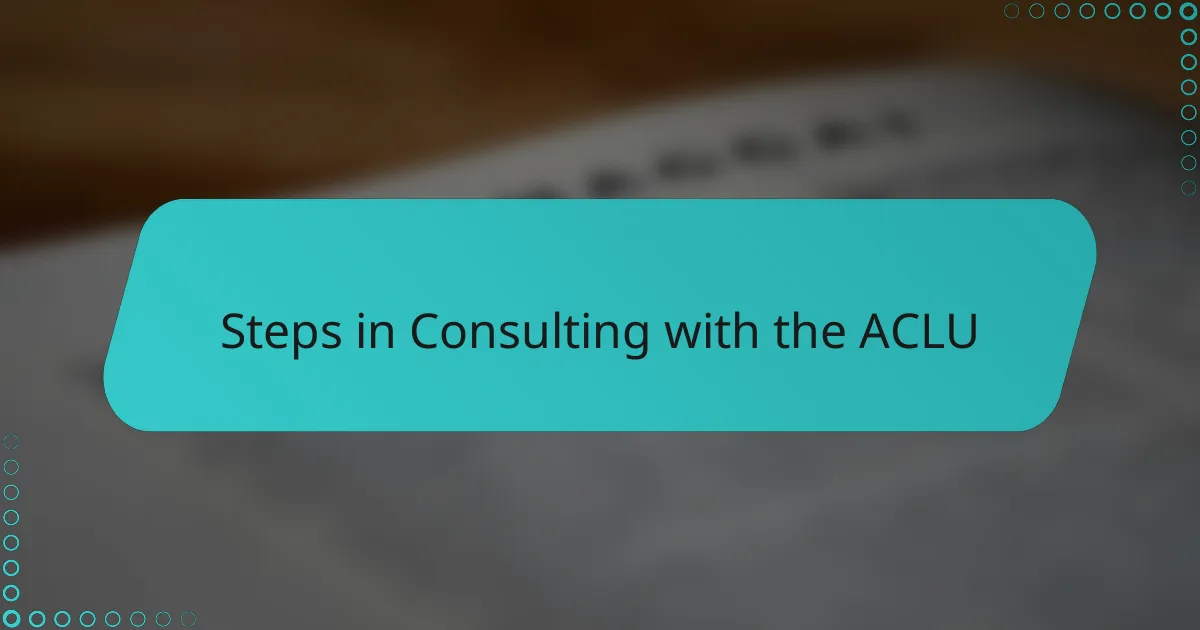
Steps in Consulting with the ACLU
The first step I took when consulting with the ACLU was reaching out through their website’s intake form. Have you ever hesitated before pressing “submit” on an important message? I remember feeling a mix of hope and nerves, wondering if my concern would even get noticed. It turned out that being clear and concise in describing my issue made the process smoother and showed how seriously I took the matter.
Next came the intake interview, which felt surprisingly more like a conversation than a formal interrogation. I made sure to share all the relevant facts, even those that felt uncomfortable to discuss. This transparency, I learned, helps the ACLU understand the full scope and decide how best to assist. Have you ever withheld information out of fear? I realized that openness was the bridge to effective legal advocacy.
Finally, after establishing the basics, the ACLU team explained the potential paths forward and what I could realistically expect. I was grateful they took the time to answer my questions and clarify next steps—I left that meeting feeling empowered rather than overwhelmed. Isn’t it reassuring when a complex process becomes understandable through patient guidance? That’s what makes consulting with an organization like the ACLU truly valuable.
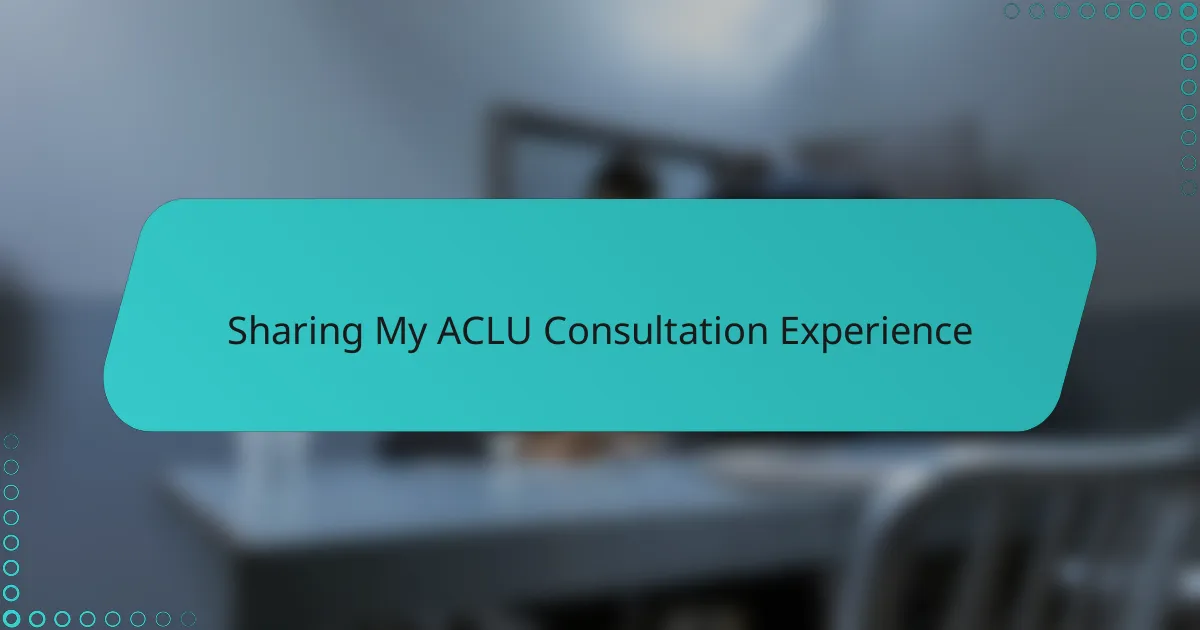
Sharing My ACLU Consultation Experience
When I think back to sharing my experience consulting with the ACLU, what stands out most is the sense of being truly heard. Did you ever have that moment when you reveal your story and, instead of judgment, you receive genuine attentiveness? It was refreshing to feel that my concerns mattered in a way that went beyond the typical legal exchange.
I also remember how the ACLU’s team took complex legal concepts and made them approachable, almost like we were collaborators rather than just client and lawyer. Doesn’t it make a difference when you’re part of the conversation, not just a bystander? That level of engagement gave me a clear path forward and a renewed sense of hope.
At times, I found myself grappling with anxiety about the outcome, but talking openly during the consultation helped me transform uncertainty into clarity. Have you noticed how just knowing the next steps can ease your mind? For me, that clarity felt like the first victory in what seemed like a daunting fight for justice.
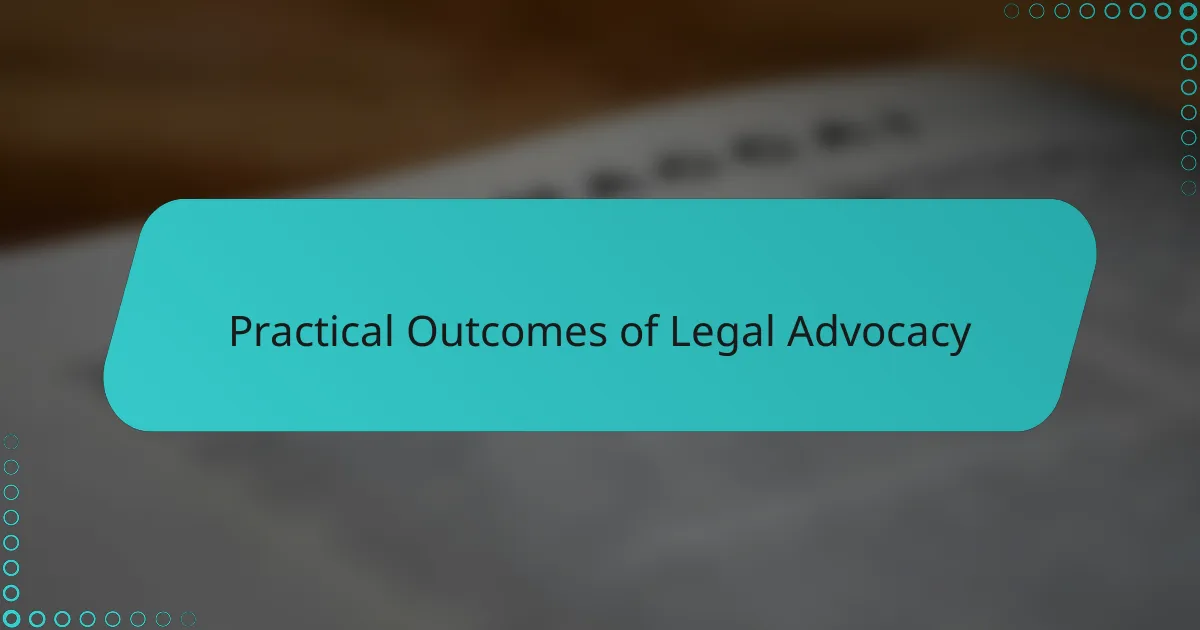
Practical Outcomes of Legal Advocacy
Legal advocacy, from what I’ve seen, turns principles into real change—sometimes it’s about securing a settlement that restores a person’s rights, other times it’s about shifting policies that affect entire communities. Have you ever considered how a single legal victory can ripple beyond just one case? That’s the power advocacy holds when it’s done thoughtfully and courageously.
In my experience, practical outcomes often include more than courtroom wins; they can mean new legislation that better protects civil liberties or increased public awareness that changes how people think about justice. I recall a case where advocacy led to improved police accountability measures—not just for one victim, but for countless others who might have faced similar injustices.
What really stays with me is how legal advocacy can transform individuals’ lives by providing not just legal relief, but also hope and validation. Isn’t it something to witness the moment a person realizes that the law can be on their side? That moment is, to me, one of the most tangible and impactful results advocacy can achieve.
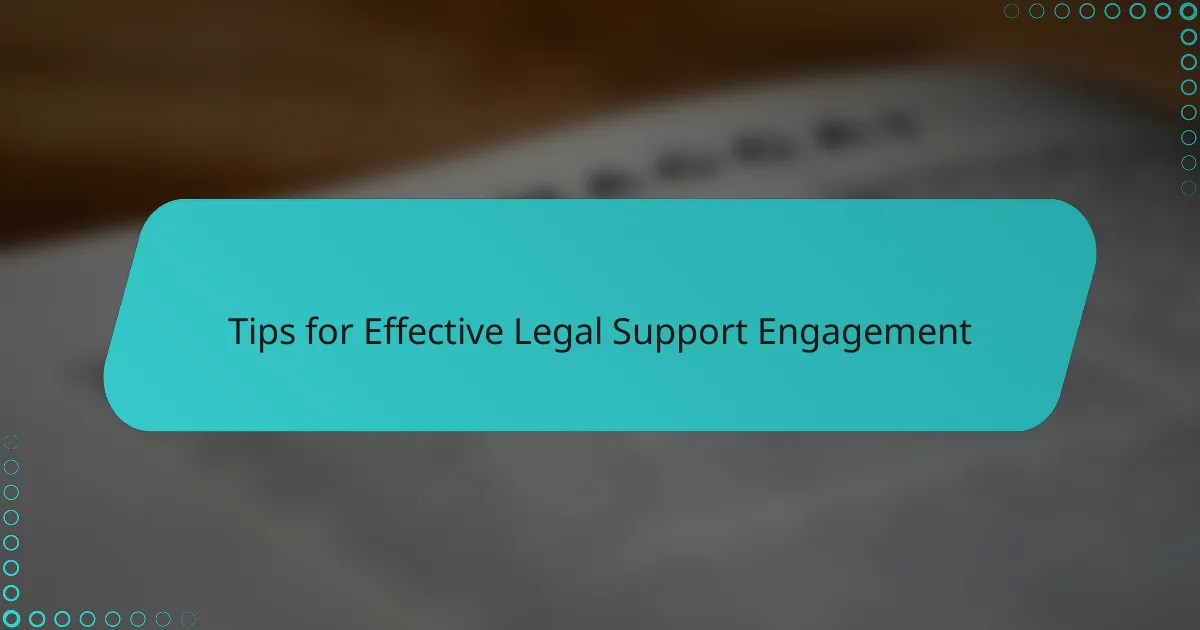
Tips for Effective Legal Support Engagement
One thing I’ve learned when engaging legal support is the absolute necessity of clear communication. Have you ever felt frustrated because your lawyer seemed out of the loop? I found that being upfront about my goals and concerns helped keep everyone on the same page, making the collaboration much more effective.
Another tip that really helped me was setting realistic expectations from the start. It’s easy to hope for quick fixes, but legal processes often take time and patience. When I accepted that, I was able to focus on steady progress rather than immediate results, which made the whole experience less stressful.
Lastly, I can’t emphasize enough how vital it is to stay actively involved throughout the process. Don’t just hand everything over and wait—ask questions, request updates, and share any new information. From my own experience, this ongoing engagement not only empowers you but also helps your legal team tailor their strategy to what truly matters.
